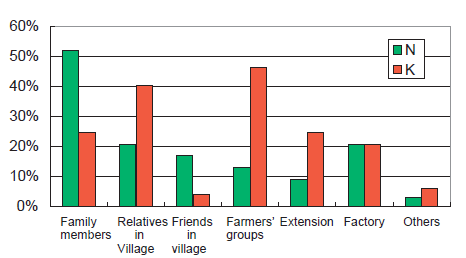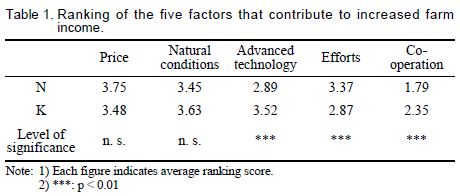Farmers’ ways of thinking and their information routes
Description
The development of farm management methodology is influenced by both human and physical factors. One of the most important human factors is the way in which people think about farming. However, there has been little research in this area, especially with respect to developing countries. The research described below concerns the influence of human factors, examined in a project entitled “Increasing economic options in rainfed agriculture in Indochina through efficient use of water resources.”
A survey in the form of a questionnaire was carried out in two villages having similar agricultural conditions, located near Khon Kaen City. We firstly asked 100 farmers in each village about the sources of their agricultural information. The different types of information routes between the two villages are shown in Fig. 1. In N Village, 52% of the farmers receive information from only their family members, whereas 46% of those in K Village obtain information from farmers’ groups which are supported by NGOs. In short, farmers in N Village appear to be isolated information-wise, while the farmers in K Village have greater opportunity to obtain information though groups which have greater access to many different kinds of information.
Secondly, we asked the farmers to rank the five most important contributors to increased farm income. They were 1) price, 2) natural conditions such as rainfall and soil, 3) introduction of advanced technology, 4) their own efforts on the farm such as hard work and conscientiousness, and 5) cooperation with others. Table 1 shows that the farmers in both villages regard prices and natural conditions as the most important factors that affect their farm income. Farms in these rainfed areas do in fact suffer from erratic rainfall and price fluctuations, so it is easy to see why prices and natural conditions are important to the farmers. Unfortunately, these factors are difficult to control. Additionally, cooperation with others is regarded by farmers in both villages as least important. This would be an interesting topic to pursue in further research since it involves the fundamental character of Thai farmers. Excluding these three factors, it can be seen that several differences exist between the two villages. That is, the introduction of advanced technology is regarded as more important in K Village, while farmers’ own efforts were more important in N Village. We cannot identify how farmers’ ways of thinking or behavior are influenced by the route by which they gain information, but it is clear that in K Village farmers are looking forward to the introduction of advanced technology in order to improve farming methodology and increase income levels through participation in farmers’ group activities.
In developing countries, it is often the case that farmers do not have sufficient opportunity to obtain the information that would be of use to them, since they have poor access to information services and transportation, and extension service systems are not well established. Our study indicates that group activities have the potential to provide farmers with a means of obtaining better information and changing their ways of thinking, and that this is an important factor in the development of technology leading to improved farm management.
Figure, table
-
Fig. 1. Sources of agricultural information. -
- Affiliation
-
Japan International Research Center for Agricultural Sciences Development Research Division
- Classification
-
Technical A
- Term of research
-
2004FY(FY2002~2004)/(FY2004~2005)
- Responsible researcher
-
ANDO Masuo ( Development Research Division )
SUPHANCHAIMAT Nongluck ( Khon Kaen University )
- ほか
- Publication, etc.
-
Ando, M. (2003):Intensive land-use with farm pond irrigation and its limitations in Northeast Thailand. UN International symposium “Alternative approaches to enhancing small-scale livinghoods and natural resources management in marginal areas” proceedings 89-101.
Ando, M. ・Nongluck Suphanchaimat (2004):“Identification of socio-economics factors and conditions for sustainable farm management in Northeast Thailand”. National Research Council of Thailand Report.
- Japanese PDF
-
2004_01_A3_ja.pdf623.68 KB


